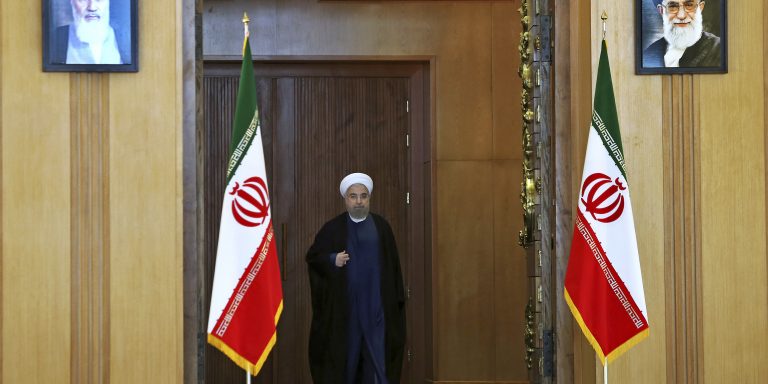INTELBRIEF
May 7, 2018
IntelBrief: Iran Deal Pullout Likely

- President Donald Trump is likely to withdraw the United States from the landmark 2015 multilateral nuclear accord with Iran by allowing some U.S. sanctions to go back into effect on May 12.
- Russia, China, and the three European parties to the accord will try to keep the agreement operating even without U.S. participation, substantially diluting the effect of re-imposed U.S. sanctions on Iran.
- Iran will not immediately leave the agreement if the United States does, but Iran’s longer term response will depend on the economic effects of re-imposed sanctions.
- Iran is unlikely, under any circumstances, to renegotiate the agreement or negotiate a supplementary accord covering non-nuclear issues.
.
Based on his recent statements, and despite the pleadings of major European leaders, President Trump is likely to allow key U.S. sanctions on Iran to go back into effect when a waiver of one of the major sanctions laws expires on May 12.Doing so will essentially take the U.S. out of the 2015 Joint Comprehensive Plan of Action (JCPOA), to which Britain, France, Germany, Russia, and China, in addition to Iran and the United States, are parties. As a candidate and as president, Trump has consistently argued that the accord is ‘the worst deal ever’ because the nuclear restrictions are limited in scope and they begin to expire in 2025. He has insisted that the JCPOA be renegotiated to encompass all U.S. concerns about Iran, including not only the expiration of the nuclear restrictions, but also Iran’s development of ballistic missiles and its regional ‘malign activities.’ France and Germany’s leaders visited President Trump in late April offering to try to ‘fix’ the agreement through agreed joint U.S.-European action on all issues of concern, but they appear to have failed thus far to satisfy Trump’s requirements to stay in the JCPOA.
A U.S. pullout will not collapse the accord if the other parties, including Iran, continue to implement their commitments, and the Europeans, as well as Russia and China, have vowed to do just that. These countries, as well as other countries that buy Iran’s oil and transact substantial business with Iran, are likely to encourage their multinational firms to remain in the Iran market despite the threat from re-imposed U.S. sanctions. Many multinational companies might do so, particularly if their parent governments compensate them or try to shield them from U.S. penalties. The European Union will not adopt a blanket ban on imports of crude oil from Iran as it did in 2012, nor will the Brussels-based SWIFT electronic payments system repeat its 2013 decision to expel Iranian banks from its network. It is likely that re-imposed U.S. sanctions will not have nearly the effect on Iran’s economy that they did during 2011-2015, when the international community joined the United States in imposing sanctions on Iran.
Whether Iranian leaders stay in the agreement will depend on that precise question—the extent to which re-imposed U.S. sanctions harm Iran’s economy. If Iran’s economy suffers only minimal damage, Iran could potentially stay in the JCPOA indefinitely. Conversely, Iran’s leaders have indicated that they will exit the accord and revive their nuclear program if a U.S. withdrawal causes Iran to cease obtaining economic benefit from the agreement. A significant economic downturn would undermine Iranian President Hassan Rouhani and empower hardliners who were skeptical of making nuclear concessions when the deal was negotiated in 2015. It is certain that, no matter how much Iran’s economy is pressured by renewed U.S. sanctions, Iran will not renegotiate the accord—or negotiate a supplementary agreement—to accommodate President Trump’s demands. Iran’s view, which is to a large extent shared by the non-U.S. parties to the deal, is that it has complied with the deal’s terms and it cannot be asked for new concessions. Iran’s political system and population have proved sufficiently resilient to avoid capitulation under even severe economic deprivation.
.
For tailored research and analysis, please contact: info@thesoufancenter.org
[video width="960" height="540" mp4="https://thesoufancenter.org/wp-content/uploads/2018/05/Final-Edit-1-188.mp4" poster="https://thesoufancenter.org/wp-content/uploads/2018/05/AP_772534203016.jpg"][/video]